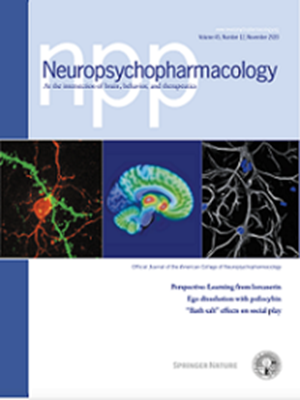Acute dose-dependent effects and self-guided titration of continuous N,N-dimethyltryptamine infusions in a double-blind placebo-controlled study in healthy participants
IF 6.6
1区 医学
Q1 NEUROSCIENCES
引用次数: 0
Abstract
N,N-dimethyltryptamine (DMT) is a serotonergic psychedelic that is known for its short-lasting effects when administered intravenously. Several studies have investigated the administration of intravenous boluses or combinations of a bolus and a subsequent continuous infusion. However, data on dose-dependent acute effects and pharmacokinetics of continuous DMT infusions are lacking. We used a double-blind, randomized, placebo-controlled, crossover design in 22 healthy participants (11 women, 11 men) who received placebo and DMT (0.6, 1.2, 1.8, and 2.4 mg/min) over an infusion duration of 120 min. We also tested a self-guided titration scheme that allowed participants to adjust the DMT dose rate at prespecified time points to achieve their desired level of subjective effects. Outcome measures included subjective effects, autonomic effects, adverse effects, plasma hormone concentrations, and pharmacokinetics up to 3 h after starting the infusion. DMT infusions exhibited dose-proportional pharmacokinetics and rapidly induced dose-dependent subjective effects that reached a plateau after 30 min. A ceiling effect was observed for “good drug effect” at 1.8 mg/min. The 2.4 mg/min dose of DMT induced greater anxious ego dissolution than the 1.8 mg/min dose and induced significant anxiety compared with placebo. We observed moderate acute tolerance to acute effects of DMT. In the self-guided titration session, the participants opted for moderate to strong psychedelic effects, comparable in intensity to the 1.8 mg/min DMT dose rate in the randomized dosing sessions. These results may assist with dose finding for future DMT research and demonstrate that acute subjective effects of DMT can be rapidly adjusted through dose titration.

在一项健康参与者的双盲安慰剂对照研究中,连续N,N-二甲基色胺输注的急性剂量依赖效应和自我引导滴定
N,N-二甲基色胺(DMT)是一种5 -羟色胺能致幻剂,以其静脉注射后的短期效果而闻名。几项研究调查了静脉注射小丸或小丸与随后持续输注的组合。然而,关于连续输注DMT的剂量依赖性急性效应和药代动力学的数据缺乏。我们对22名健康受试者(11名女性,11名男性)采用双盲、随机、安慰剂对照、交叉设计,他们在120分钟的输注时间内接受安慰剂和DMT(0.6、1.2、1.8和2.4 mg/min)。我们还测试了一种自我引导的滴定方案,该方案允许参与者在预定的时间点调整DMT剂量率,以达到他们期望的主观效应水平。结果测量包括开始输注后3小时的主观效应、自主效应、不良反应、血浆激素浓度和药代动力学。DMT输注表现出剂量比例药代动力学和快速诱导的剂量依赖主观效应,并在30分钟后达到平台期。当剂量为1.8 mg/min时,出现“良好药效”的上限效应。2.4 mg/min剂量的DMT诱导焦虑自我消解大于1.8 mg/min剂量,诱导焦虑显著高于安慰剂。我们观察到对DMT急性效应的中度急性耐受性。在自我引导的滴定过程中,参与者选择了中等到强烈的迷幻效果,其强度与随机给药过程中1.8 mg/min的DMT剂量率相当。这些结果可能有助于未来DMT研究的剂量确定,并证明DMT的急性主观效应可以通过剂量滴定快速调整。
本文章由计算机程序翻译,如有差异,请以英文原文为准。
求助全文
约1分钟内获得全文
求助全文
来源期刊

Neuropsychopharmacology
医学-精神病学
CiteScore
15.00
自引率
2.60%
发文量
240
审稿时长
2 months
期刊介绍:
Neuropsychopharmacology is a reputable international scientific journal that serves as the official publication of the American College of Neuropsychopharmacology (ACNP). The journal's primary focus is on research that enhances our knowledge of the brain and behavior, with a particular emphasis on the molecular, cellular, physiological, and psychological aspects of substances that affect the central nervous system (CNS). It also aims to identify new molecular targets for the development of future drugs.
The journal prioritizes original research reports, but it also welcomes mini-reviews and perspectives, which are often solicited by the editorial office. These types of articles provide valuable insights and syntheses of current research trends and future directions in the field of neuroscience and pharmacology.
 求助内容:
求助内容: 应助结果提醒方式:
应助结果提醒方式:


